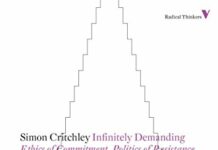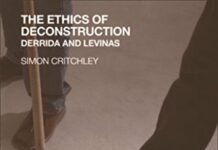
Ebook Info
- Published: 2019
- Number of pages: 273 pages
- Format: PDF
- File Size: 2.11 MB
- Authors: Simon Critchley
Description
From the moderator of The New York Times philosophy blog “The Stone,” a book that argues that if we want to understand ourselves we have to go back to theater, to the stage of our livesTragedy presents a world of conflict and troubling emotion, a world where private and public lives collide and collapse. A world where morality is ambiguous and the powerful humiliate and destroy the powerless. A world where justice always seems to be on both sides of a conflict and sugarcoated words serve as cover for clandestine operations of violence. A world rather like our own.The ancient Greeks hold a mirror up to us, in which we see all the desolation and delusion of our lives but also the terrifying beauty and intensity of existence. This is not a time for consolation prizes and the fatuous banalities of the self-help industry and pop philosophy.Tragedy allows us to glimpse, in its harsh and unforgiving glare, the burning core of our aliveness. If we give ourselves the chance to look at tragedy, we might see further and more clearly.
User’s Reviews
Reviews from Amazon users which were colected at the time this book was published on the website:
⭐In my undergraduate studies in the 1960s, I became interested in Shakespeare’s tragedies and, to a lesser extent, in tragedies by his contemporary playwrights. On my own in the summer of 1963, I slowly but surely read through James Joyce’s novel Ulysses, even though I had not previously read the Homeric epics the Iliad and the Odyssey. When I did eventually read them, I read them in English translation. To this day, I am, like St. Thomas Aquinas, the famous medieval Catholic Aristotelian philosopher and theologian, Greekless.During my undergraduate studies, I first heard of Eric A. Havelock’s book Preface to Plato (Belknap Press of Harvard University Press, 1963). However, I do not remember when I first read it. But also see Havelock’s book The Greek Concept of Justice: From Its Shadow in Homer to Its Substance in Plato (Harvard University Press, 1978).I heard of Havelock’s book in two undergraduate English courses that I took from the American Jesuit Renaissance specialist and cultural historian Walter J. Ong (1912-2003; Ph.D. in English, 1955) at Saint Louis University, the Jesuit university in St. Louis, Missouri. His massively researched doctoral dissertation included the history of rhetoric and formal logic in Western culture. Ong characterized his thought as phenomenological and personalist in cast. However, he often singles out Plato for critique. In this respect, he work is part of what Whitehead referred to as footnotes to Plato.In any event, in 1987, I was very interested in Warwick Wadlington’s book Reading Faulknerian Tragedy (Cornell University Press). Because Faulkner wrote no plays, Wadlington, a professor of English at the University of Texas at Austin, was obviously using the term “Faulknerian Tragedy” in the title in an honorific way to call attention to a certain dramatic quality about Faulkner’s major novels.In 2013, I was also interested in Simon Critchley and Jamieson Webster’s book Stay Illusion! The Hamlet Doctrine (Pantheon Books). Critchley was identified as a philosophy professor at the New School for Social Research in New York City, and Webster was identified as a psychoanalyst in private practice in New York City. Oddly enough, their detailed discussion of Shakespeare’s most famous tragedy included discussion of a fragment attributed to a little-known ancient Greek thinker and teacher of rhetoric named Gorgias (c.483-375 BCE; pages 15-19, 22, 23, 27, 45, 59, 191, 231).In the spirit of giving credit where credit is due, I was willing to give Gorgias credit for the insight that Critchley and Jamison credited him with having about how to understand tragedy as a genre performed live in a theater in their 2013 book.Because Socrates (c.470-399 BCE) is considered to be a pivotal reference point in the history of Western philosophy, Gorgias and certain other ancient Greek thinkers are referred to collectively as pre-Socrates. Western philosophy decisively emerges in the dialogues of Plato (born c.428; died c.347 BCE). Plato expressed and manifested his grief and mourning about the death of his teacher Socrates by commemorating his memory in a character in his dialogues named Socrates. One of Plato’s dialogues is named after Gorgias.In 2017, I read Emily Katz Anhalt’s book Enraged: Why Violent Times Need Ancient Greek Myths (Yale University Press).Now, in Critchley’s accessible new book Tragedy, the Greeks, and Us (Pantheon Books, 2019), Gorgias emerges as the hero, because the fragment attributed to him provides Critchley with a key insight (pages 5, 21-24, 33, 45, 48, 62, 93-94, 95, 96, 98-114, 117, 119, 261, and 275).The book includes sixty-one short chapters grouped into six parts:Part I: Introduction: includes chapters 1-7, pages 1-29;Part II: Tragedy: includes chapters 8-18, pages 31-87;Part III: Sophistry: includes chapters 19-29, pages 89-133;Part IV: Plato: includes chapters 30-38, pages 135-182;Part V: Aristotle: includes chapters 39-59, pages 183-267;Part VI: Conclusion: includes chapters 60-61, pages 269-280.The book also includes “Acknowledgments: Why This Book Was Hard to Write – and Thanks,” pages 283-285; notes, pages 287-300; bibliography, pages 301-305 ; an index, pages 307-322; a note about the author, page 323; and a note about the type, page 324.Just as Aristotle is part of what Whitehead referred to as footnotes to Plato, so too is Critchley’s new book. Indeed, his new book appears to be written by one philosophy professor for “Us [Philosophy Professors].” And perhaps also for graduate students who aspire to become philosophy professors.In any event, I would draw your attention to chapter 8: “Tragedy as Invention, or the Invention of Tragedy: Twelve Theses” (pages 33-35). Critchley’s twelve these provide an excellent preview/overview of certain key arguments that he develops in the course of his book. However, the sheer multiplicity and diversity of his twelve theses can serve as one reason why I am not going to critique all of them here.However, I want to offer a nit-picking argument about his wording in his somewhat lengthy summation of thesis 12. The wording involves his characterization of “the dissolution of all the markers of certitude” (page 35). Now, Aristotle is generally credited with inventing the formal study of logic. In syllogistic logic, the conclusion follows from the premises, provided that all of the terms in the premises are operationally defined and used as univocal terms. Then the conclusion expresses a certitude. (In contrast with univocal terms used in Western philosophical discourse, poetry tends to prefer the use of polysemous terms.)However, apart from syllogistic logic, all terms operational defined and used in philosophical reasoning, such as the reasoning in Plato’s various dialogue, do not express certitude, but only probable reasoning. But Critchley seems not to be aware that the philosophical reasoning involved in Plato’s dialogues involves probabilities, not certitudes.As a thought experiment, we might imagine changing Critchley’s word “certitude” in his summation of thesis 12 to the word “probability” – to wit, “the mood [of Greek tragedy] is skeptical, it is about the dissolution of all markers of probability.” I know, I know, Critchley wants to tout being skeptical, instead of trying to formulate philosophical probabilities. But isn’t it possible that Plato and then Aristotle first grasped the skeptical dimension of Greek tragedies and then tried to the best of their abilities to construct philosophical probabilities as an alternative way to think about the world? In other words, why was Western philosophical reasoning invented?After all, Critchley himself claims to be developing the philosophy of tragedy. But if there was not a good reason for inventing Western philosophy in the first place, can there now possibly be a good reason for developing the philosophy of tragedy?Now, apart from Critchley’s explicitly argued twelve theses, the theme of grief emerges in his book (pages 9, 10, 17-20, 168, 186, and 275-277). But he does not happen to advert explicitly to the death of Socrates and Plato’s mourning his death by commemorating his life-spirit in the character known as Socrates in his dialogues.Next, in Critchley’s discussion of Aristotle’s famously puzzling comments about how tragedy evokes pity and fear in people participating in a live performance, Critchley turns to Jonathan Lear for help in understanding Aristotle’s puzzling words (pages 190-192; also see Critchley’s paraphrase of Lear’s point on page 279). Critchley says, “Lear’s view is that tragedy provides a safe environment in which emotions are raised and then relieved” (page 191). In a word, Lear is describing what is known as containment.In the glossary in Dr. Justin A. Frank’s book Trump on the Couch: Inside the Mind of the President (Avery/ Penguin Random House, 2018, pages 239-257), Dr. Frank defines containment in detail (pages 239-241).Finally, we should consider the basic structure of Plato’s dialogues. In theory each of his dialogues is a script that could be enacted as a drama in a theater. So how much did Plato learn from the Greek playwrights who wrote the scripts of the tragedies that Critchley discusses? Of course, the Homeric epics also feature a lot of dialogue.For a relevant discussion of orally rooted reason, see the Canadian Jesuit Lonergan scholar Frederick E. Crowe’s 1965 essay “Neither Jew nor Greek, but One Human Nature and Operation in All” as reprinted, slightly revised in the anthology Communication and Lonergan: Common Ground for Forging the New Age (Sheed & Ward, 1993, pages 89-107).
⭐Been listening to Professor Critchley’s lectures on Tragedy online, which are brilliant. It was a pleasure to read his musings in a more paced, detailed form here. He roams around tragedy, and his logic moves, from one insight to the next–almost incapable of fully expressing all his excitement and what he has to say. Of course, what he has to say represents his education, which he’s glad to share–so you will get references here to a reading list on Tragedy. Which may be an aspect of the tragedy of reading this book. The list grows…As a fan of his, and having read a good portion of his writing, I can say that may be his best work–but that’s arguable. It’s clear in any case, he’s spent years developing his point of view on Tragedy, and because of that, there’s a richness and potency here that is deep.This book is also very needed, because beyond being wise on tragic storytelling, it’s fundamental thesis is true and so important for our world now.As a Professor myself, I will be thinking about what I learned here for some time. I will go back to it, and plan on using many questions he’s raised in my Literature classes–starting perhaps with poor Oedipus.
⭐My father passed away recently. At the funeral my mother asked my father “What am I going to do?”. I might’ve been a little confused by Mom’s question since she’s never been at a loss for things to do, but I had finished this book just days before. This book connected that moment of grief to tragedies written 2400 years ago, an insight into an unanswerable experience shared by all who have loved another.Much of the book explores the connections between Greek tragedy and the unique historical confluence of Athenian expansion and democracy, the growing judicial system, the transition to Socratic philosophy, and the Peloponnesian War. I knew something of each of those parts; now I know something of how they all fit together.+1 for the MAGA reference towards the end.
⭐Simon Critchley is among the few scholars who have mastered the art of being fully accessible to non-specialist readers, without watering down his ideas. It definitely helps to know at least the plot lines of the Greek tragedies being discussed; Critchley doesn’t spend time rehearsing the plots. What he offers is a distinctive theory of why humans need tragic theatre and how the ancient Greek plays speak to contemporary concerns. I enjoyed and admired this book in equal measure.
⭐This book really starts off strong, but after Critchley starts his in-depth dive into Plato and Aristotle it becomes far less compelling.
⭐The book will help you to rethink your relationships to art, to others, and to the world. Buy it today.
⭐This book is written by a professor of philosophy who loves theatre. Critchley shows how thinkers like Plato, Aristotle, Schelling, Hegel (and so on) have tried to capture Greek tragedy in a philosophical concept: rules, norms and values. He resists this and goes back to the plays of Aeschylus, Sophocles and Euripides to show how those various tragic theories missed the mark – usually being quite wide of the mark!.The author does a good job showing how there are no real rules of tragedy just the need to be creative and ‘alive’. Sophocles and, particularly Euripides, sought to test boundaries and flout expectations rather than be generic formulaic drama. They are blatant about this and some of their plays sound pretty odd.The book is well-written and Critichley manages to be very thorough and get into some big discussions without really being overly academic about it. He doesn’t try to reference all the research, just to glean the most interesting bits which he summarises and explains in a pleasingly relaxed and confident way. He split the book into 61 chapters and this suits this approach – he can dive into a topic for 5 or 6 pages link it back to his argument and move on. He keeps it on track and the momentum up. I found it more-ish, as I am sure it was meant to be.The big sections are on Plato’s rejection of poets, including tragic poets, in ‘The Republic’ on moralistic grounds. He contrasts this to Aristotle’s counter attempt, in the ‘Poetics’, to work from the evidence, sifting it to find the true nature of tragedy (a ground-up approach that differs from Plato’s top-down moralising approach). Both attempts are ironically tragic in the sense that it is the bits they leave out, the creative playfulness, that fatally hollows out their argument. The opening section on the sophist Gorgias was good to flag up the confusion irony causes but then there was no further reference to it when it would have helped develop and round out some of the later points.I liked best the discussion of a possible way to reconstruct Aristotle’s lost treatise on comedy (Chs. 56-7). I liked the insight, a few chapters earlier, that Aristotle wrote his Poetics during the decade (335-326BC) when Lycurgus, Athens’ civic leader, ordered the main tragedies to be gathered and stored in official versions. Critchley explains how Lycurgus wanted to protect the play texts against a new class of professional actors trying to big up their roles!But oh, dear! I have made it sound more ‘academic’ than it really is. Don’t worry – It’s all good: ‘grown-up reading’ that I recommend it to those who like that.
⭐I was expecting something different, the book mainly consist in a series of essays that are written for a more academic audience
⭐もう二年ほどある場所で、ギリシア悲劇の「アンティゴーネ」を翻訳で読み続けている。ギリシア語が読めないせいだろうか、参加者の力量もあるのだろう、驚くべきことに一回一時間半で10行も進まないのだ。いわゆる精読だ。ここまで精読すると、時々、ギリシア悲劇を読むことの意味がよくわからなくなってくる。となると時々その種の精読の罠から脱出したくなる。そういうわけで、ちょっと前にネットで見つけたのがこの本だった。作者は英国人の哲学者。作品は専門家向けではなく、一般人向けに書かれているようだ。とはいえ、本書でギリシア悲劇や哲学者の作品が取り上げられる際も、それぞれについての詳しい説明はなく、読者がこれらの作品についてすでに一定程度の知識を持っていることが前提とされている。全体の構成は、以下の6つのパートに分かれている。I. IntroductionII. TragedyIII. SophistryIV. PlatoV. AristotleVI. Conclusionそして全体は61の章に分かれている。270ページの作品だから、それぞれの章は4ページほどだ。というわけで途中で投げ出したくなる誘惑のリスクに対してはそれなりのヘッジが組み込まれている作品だ。まー何とか展開される議論についていけるのだ。著者の文体はわかりやすいものだが、使われる言葉は結構こった単語が選択されている。また文中に頻発されるギリシア語については、登場するたびに英語での説明が必ず捕捉されている。ちまちま読んでいたので思った以上に読み終えるのに時間がかかってしまった。結論から言うと、本書で展開される議論はやはりわかりにくい。いやわかりやすい部分とそうでない部分があり、そして議論は様々な方向に拡散されるので、拡散された後、全体を通しての理解が困難なのだ。それぞれの短い章での議論は、もしかすると学校での講義をベースとしているのかもしれない。丁寧でわかりやすいのだが、これらの議論がどのように有機的に展開されて結合して終わりに向かっていくのかが、ちまちま読んでいると、どうもわかりにくいのだ。「悲劇」という作品はプラトン流の合理的な哲学と対比され、なぜ「悲劇」というジャンルがプラトンから決して評価されることがなかったのたかが繰り返し説明される。この対比の文脈から、ギリシア悲劇という恐怖と憐憫(fear and pity)に訴えかける芸術がアテネの政冶体制で持った役割り、プラトン流の哲学との本質的な相違などが明らかにされていく。哲学との絡みで、必然性と自由意志の二項対立の構図にうまく収まらない「悲劇」というジャンルの特異性、そして悲劇というレパートリーの特徴などが解き明かされていく。特にアリストテレスの「詩学」という作品に相当のスペースが割かれている。ギリシア悲劇というとアイスキュロス、ソフォクレス、エウリピデスに代表されるのだが、そこで特にページが割かれるのは、「悲劇」というジャンルの脱構築への流れを示したエウリピデスなのだ。結論には、2つの章がある。その一つには「Transgenerational Curse」つまり「世代を超える呪い」という表題がついている。ここでは、「オイディプス王」を題材として、運命、自由意志と因果関係、歴史、記憶、時間、知るということ、などの基本的な視点から、作品が解釈されている。そして最後の章で強調されるのが、生の感覚としての「Aliveness」だ。悲劇はつまるところ生き生きとした演劇の作品なのだ。そういう意味ではこの結論の二つの章だけをまず最初に読んでみるというのもひとつの読み方かもしれない。お恥ずかしいながら、門外漢によるとりとめのないレビューになってしまった。
⭐
Keywords
Free Download Tragedy, the Greeks, and Us in PDF format
Tragedy, the Greeks, and Us PDF Free Download
Download Tragedy, the Greeks, and Us 2019 PDF Free
Tragedy, the Greeks, and Us 2019 PDF Free Download
Download Tragedy, the Greeks, and Us PDF
Free Download Ebook Tragedy, the Greeks, and Us





